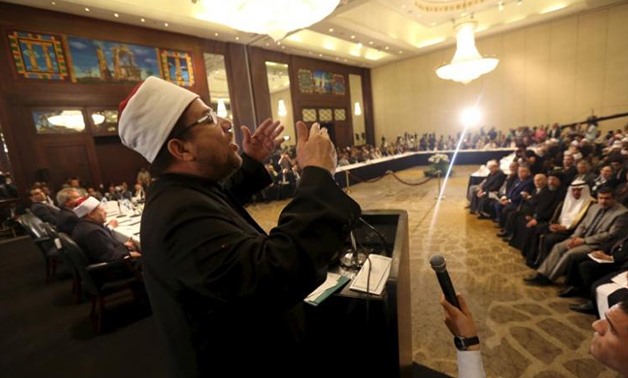
Endowment Minister Mokhtar Gomaa in 2015 - Reuters
CAIRO - 24 April 2017: Minister of Religious Endowments Mohamed Mokhtar has been requested for an inquiry at the parliament into mosques on the Nile banks that dump sewage into the river, Youm7 reported Sunday.
Member of Parliament Abdel Karim Zakaria submitted the motion to Speaker Ali Abdel Aal, expressing concern that mosques and “zawias” (small prayer rooms)pollute the Nile.
He called for diverting the sewage pipes away from the Nile or removing the mosques altogether.
Meanwhile, MPs Bakr Abou Gharib and Ghada Agamy told Youm7 on Saturday that zawias and smaller mosques in slums, and blue-collar areas pose a threat to the Egyptian society, being exploited to spread extremist ideology.
“As a state, we are now reaping what we sow by leaving these religious buildings despite their prevalence among the broader segment of Egyptians,” said Abou Gharib.
He distanced himself from demands to close all mosques that are not under the control of the Ministry of Religious Endowments, rather calling for licensing and renovating them and only opening them during prayer times.
Agamy also called on Mokhtar to control the large number of zawias in the country, saying that extremists read “a couple of books” and deliver sermons that manipulate the “ideas and feelings” of the public.
It has been revealed that Hamed Eweida, accused by the police to be an accomplice of St. George Church’s suicide bomber Mamdouh Boghdady, delivered sermons at a zawia in a rural village in Qena, Upper Egypt, where he and other alleged Islamic State members recruited people to adopt the ideology of “takfir” labeling other people, including Muslims, apostates.
The bombing of the church in Delta’s Tanta City April 9 left 29 deaths, and Eweida is still at large.
Since 2013, preachers unlicensed by the Ministry of Religious Endowments have been banned from delivering sermons; however, zawias in rural places continue to operate out of official sight.
Comments
Leave a Comment